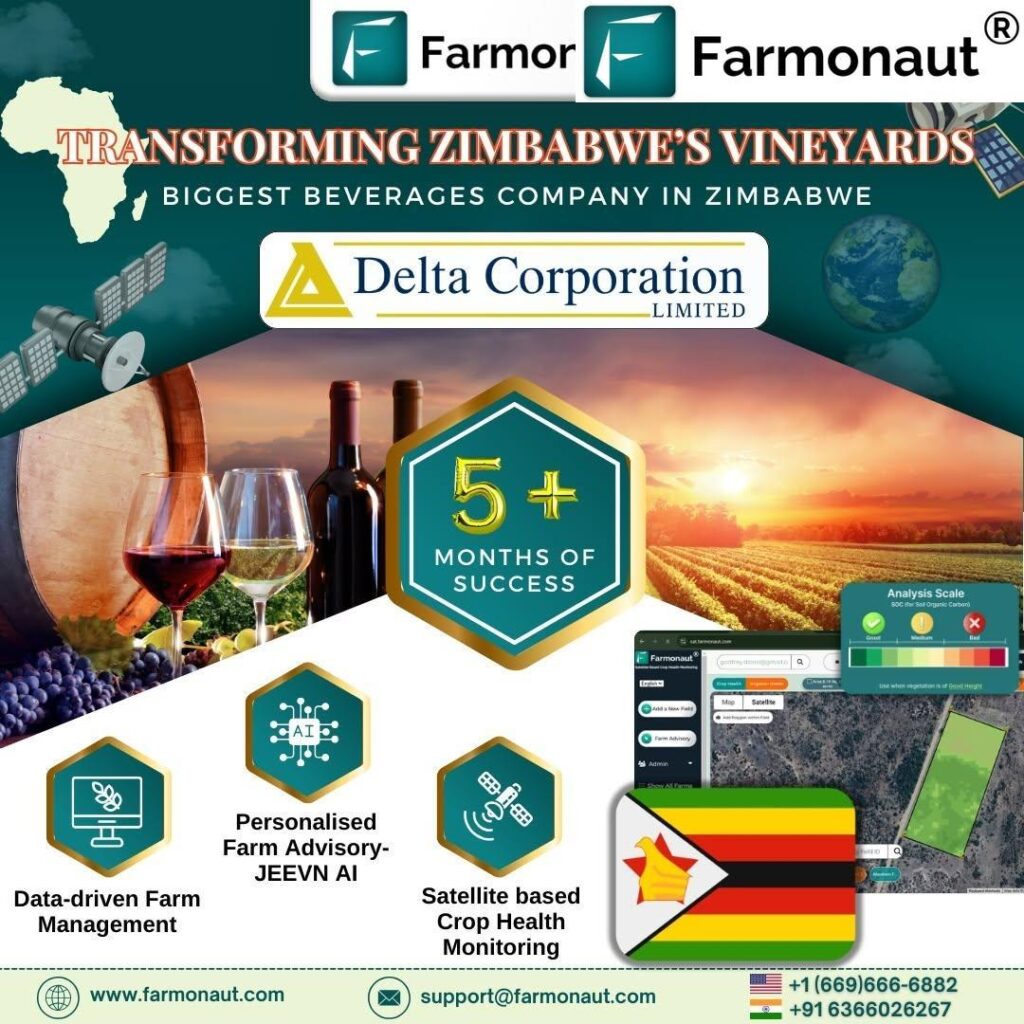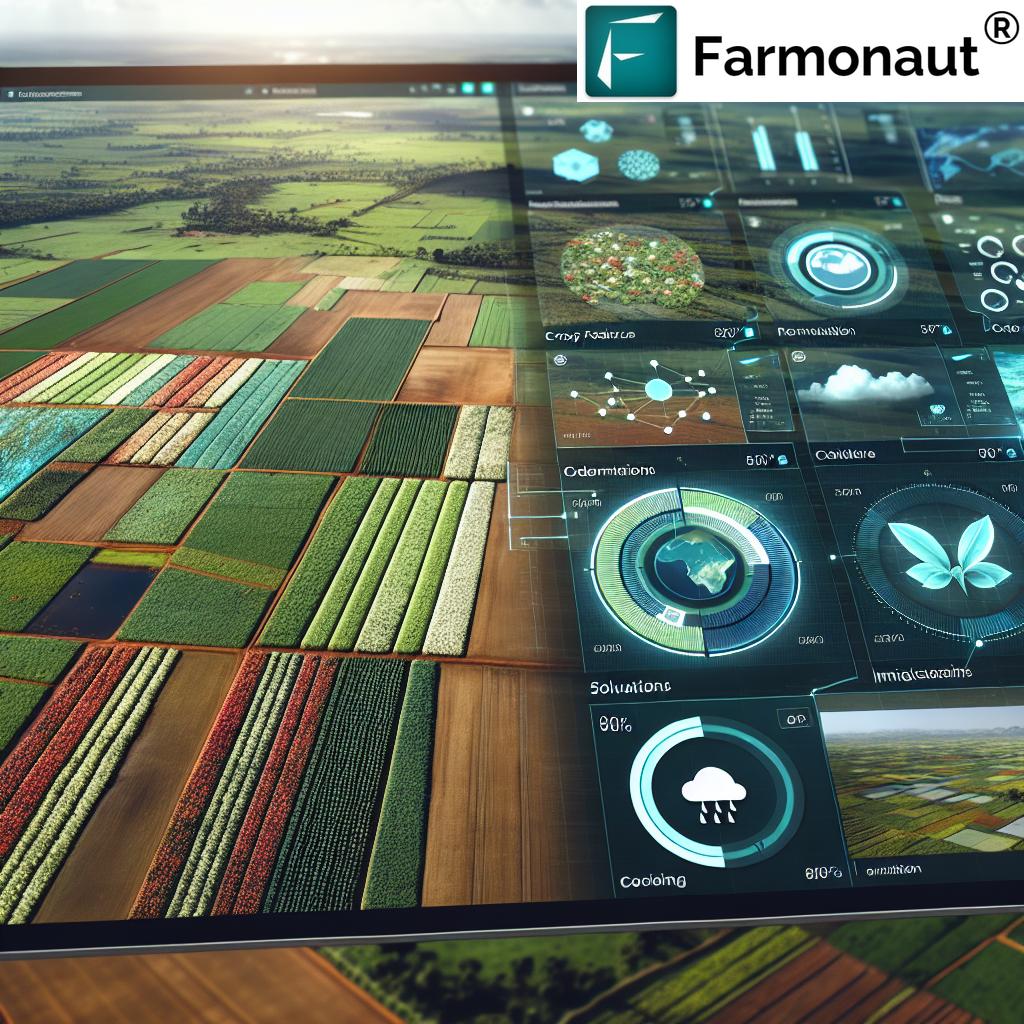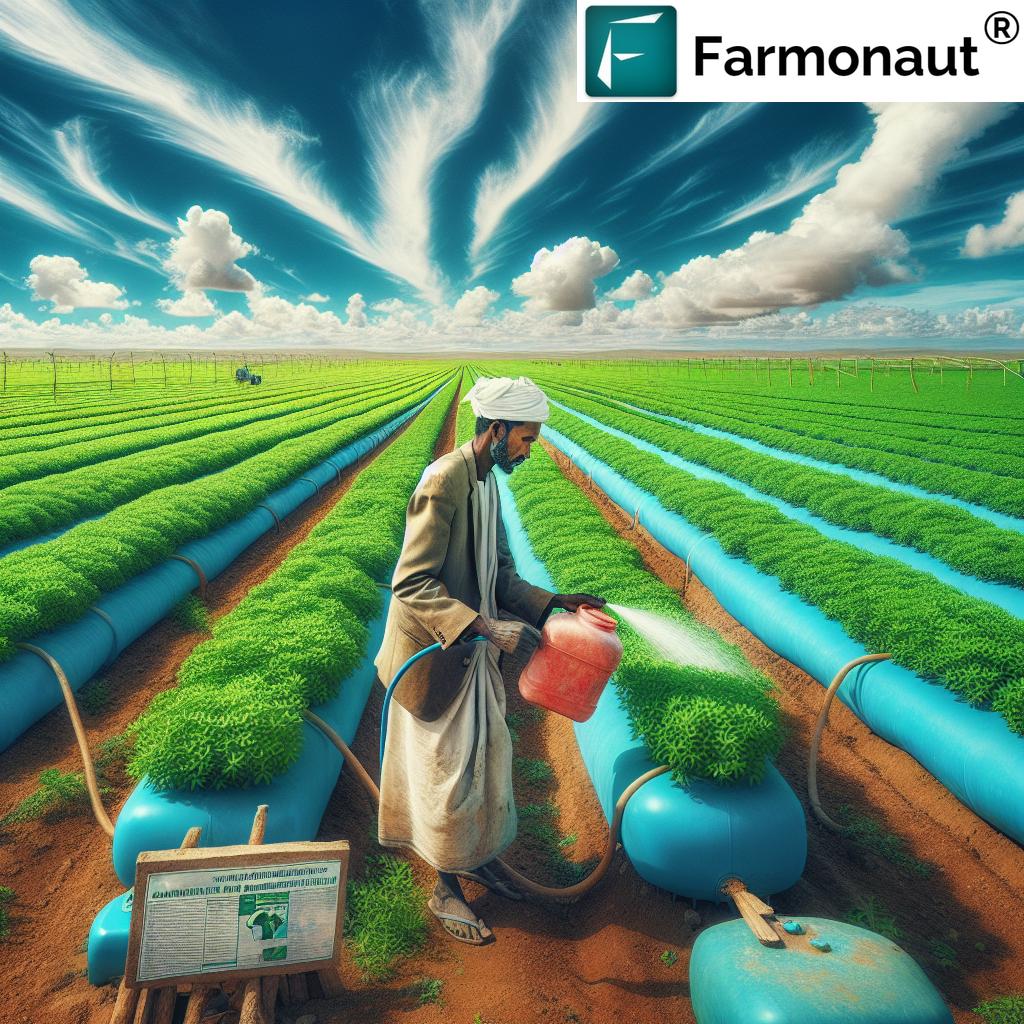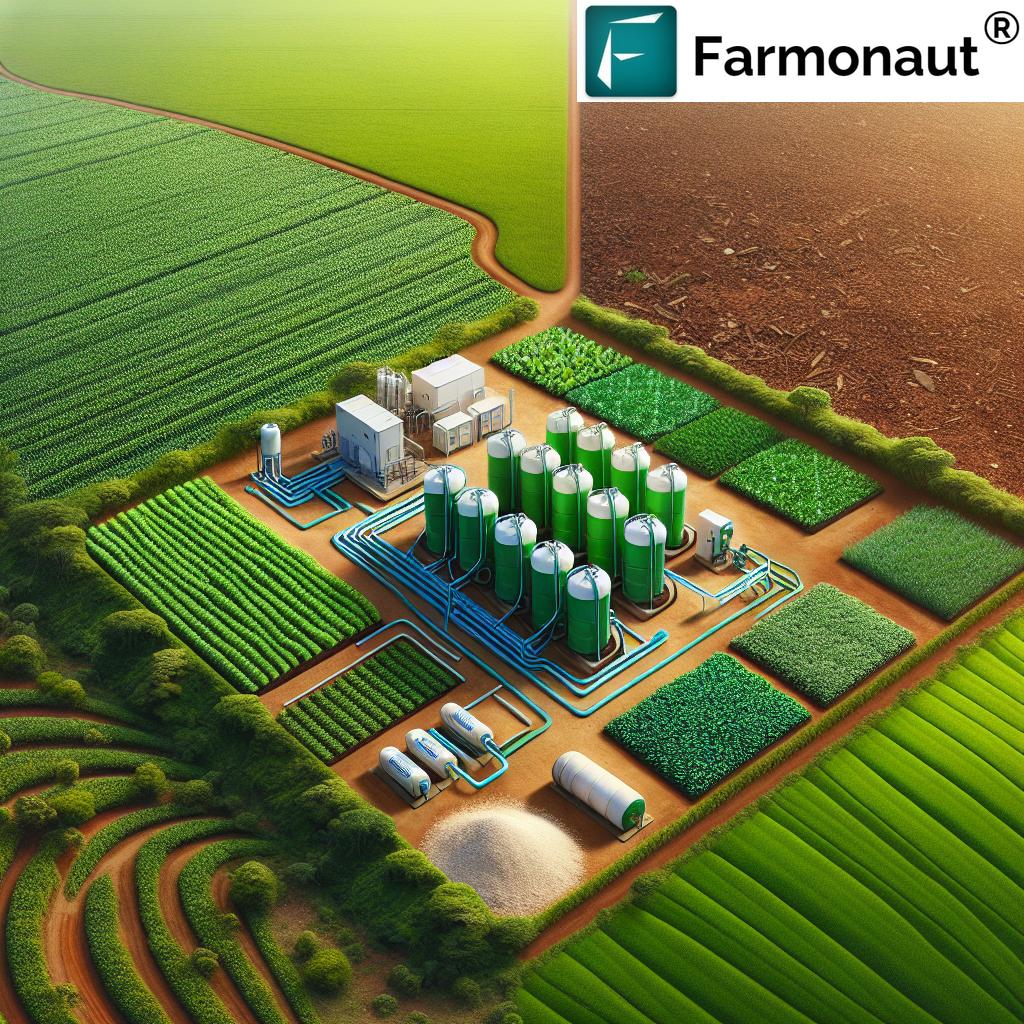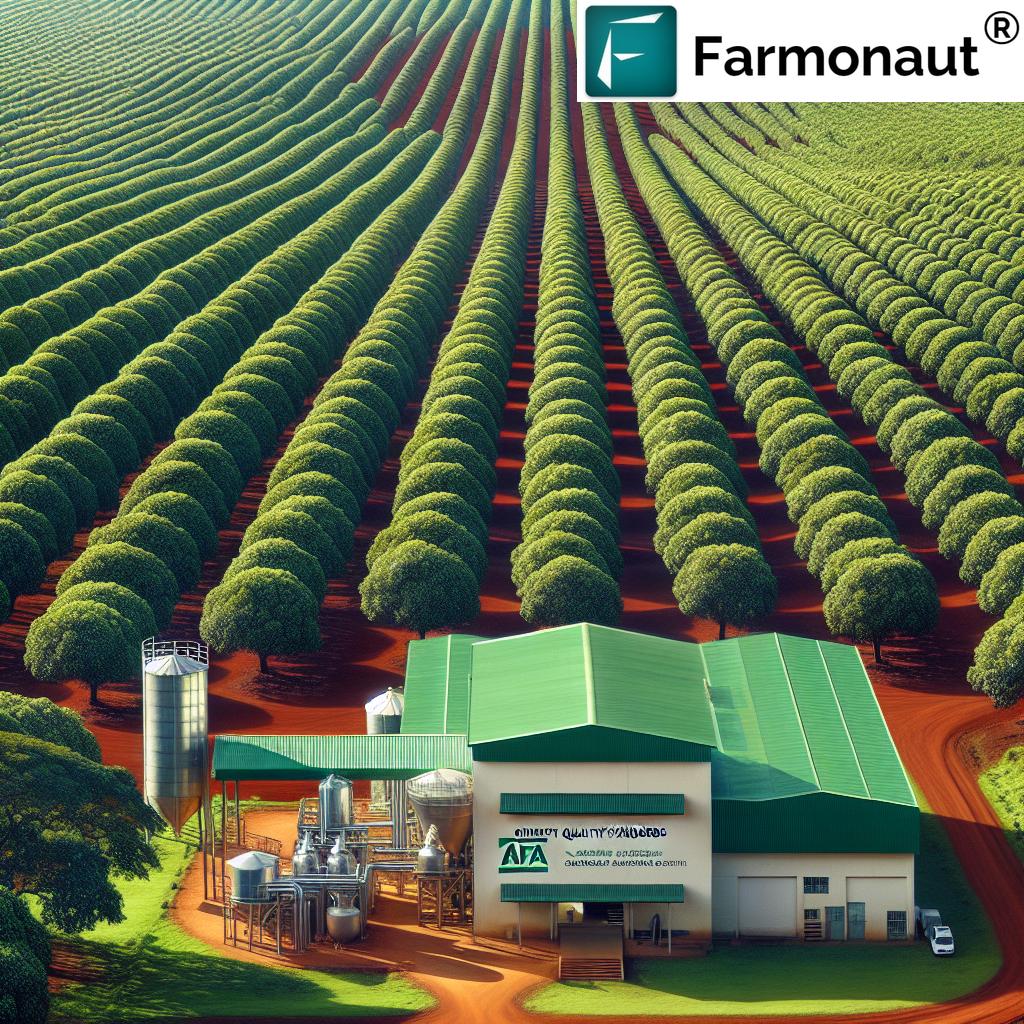Cocoa Farming in Ghana: 2025 Trends & Programs
Table of Contents
- The Significance of Cocoa Farming in Ghana
- Current State of Ghana Cocoa Farming in 2025
- Trends & Programs Overview Table
- The Ghana Cocoa Farming Program
- Best Practices in Cocoa Farming in Ghana, 2025
- Challenges Facing Ghana Cocoa Farming
- Technological Innovations in Cocoa Farming: 2025 and Beyond
- Future Prospects & Opportunities for Cocoa Farming in Ghana
- How Farmonaut Empowers Sustainable Cocoa Farming
- Conclusion: The Path Forward for Ghana Cocoa Sector
- FAQ: Ghana Cocoa Farming in 2025
“Ghana produced over 800,000 metric tons of cocoa in 2023, making it the world’s second-largest cocoa producer.”
The Significance of Cocoa Farming in Ghana
Cocoa farming in Ghana is a cornerstone of the nation’s agricultural sector and a vital source of livelihood for millions of Ghanaian farmers and their families. As of 2025, Ghana maintains its position as the world’s second-largest cocoa producer, consistently competing with neighboring Côte d’Ivoire, and playing a pivotal role in stabilizing the global chocolate supply chain.
The importance of cocoa farming in Ghana extends beyond agricultural output. It:
- Contributes approximately 20% of Ghana’s agricultural GDP.
- Provides direct employment to over 800,000 farming households.
- Remains a critical foreign exchange earner after gold.
- Pivotal in rural development, poverty reduction, and infrastructure improvements across leading cocoa-producing regions like Ashanti, Western North, Central, Eastern, Brong Ahafo, and others.
Ghana’s cocoa is globally recognized and often prized by chocolatiers and manufacturers for its superior flavor and aroma. Its sustained relevance highlights national economic importance while demonstrating the social and cultural value placed on cocoa as a symbol of prosperity, tradition, and development.
Current State of Ghana Cocoa Farming in 2025
In 2025, cocoa farming in Ghana exemplifies a blend of tradition and innovation. The Ghanaian cocoa sector is shaped by advancements in agricultural practices, robust government programs, environmental challenges, and dynamic global market trends.
Ghana produces close to 1 million metric tons of cocoa beans annually. Key features of the sector’s current state include:
- Sustainable Farming Practices: Broad adoption of integrated pest management, agroforestry systems, and improved soil fertility management techniques.
- Climate Change Adaptation: Proactive measures address increasingly erratic rainfall, higher temperatures, and the threat of extreme weather events influencing yields and farm productivity.
- Technology and Innovation: Mobile and digital platforms enhance farm inputs distribution and market access, while precision agriculture tools and remote-sensing increasingly support farm management.
- Youth Engagement: Programs are in place to attract a younger demographic to cocoa farming through vocational training and entrepreneurship support to counter an aging farmer population.
The Ghana Cocoa Board (COCOBOD) continues to lead with comprehensive sector interventions, working alongside private sector stakeholders, international NGOs, and farmer organizations.
“Over 60% of Ghana’s cocoa farms are now enrolled in sustainability programs to meet 2025 industry standards.”
Trends & Programs Overview Table: Cocoa Farming in Ghana 2025
To provide a comprehensive overview of ghana cocoa farming sector trends and programs in 2025, the following table summarizes major sector trends, key sustainability programs, and critical challenges influencing the industry.
| Trend/Program | Description | Estimated Impact | Stakeholders Involved |
|---|---|---|---|
| Agroforestry Adoption | Integration of shade trees and timber species into cocoa plots to enhance biodiversity and provide microclimate benefits. | 10–20% yield increase, reduced deforestation, improved soil health | COCOBOD, farmers, NGOs |
| Digital Farm Management Tools | Use of satellite-based and mobile platforms for farm monitoring, input distribution, and advisory services. | Up to 25% higher productivity, improved resource use, enhanced traceability | Farmonaut, tech companies, COCOBOD |
| Climate Resilience Initiatives | Development and distribution of climate-resilient cocoa varieties, shade tree promotion, and diversified farming systems. | Improved resilience to drought/heat, 30% lower farm losses in extreme years | Govt., research institutions, farmers |
| Certification & Sustainability Programs | Certification standards (e.g. Fairtrade) encourage sustainable practices and allow access to premium markets for ethical cocoa. | Higher incomes (up to 40% premium), environmental gains | COCOBOD, farmer associations, buyers |
| Improved Seedlings Program | Distribution of disease-resistant, high-yielding cocoa seedlings to replace old, less productive trees. | Yield gains (25%+), rejuvenation of >100,000 ha/year | COCOBOD, nurseries, farmers |
| Youth Inclusion Initiatives | Specialized training and incentive programs drawing youth into cocoa sector careers. | Reduction in aging farmer gap, injection of innovation | COCOBOD, NGOs, training centers |
| Access to Finance Programs | Affordable credit and insurance for inputs, farm expansion, and sustainability investments. | More investment in farms, lower risk | Banks, COCOBOD, fintech |
| Integrated Pest and Disease Management | Coordinated biological and chemical interventions against pests/diseases (CSSVD, black pod). | Yield protection, up to 30% reduction in crop loss | Farmers, extension, government |
The Ghana Cocoa Farming Program: COCOBOD-Led Initiatives
The Ghana Cocoa Board (COCOBOD) forms the backbone of cocoa industry management and oversight in the country. Through a suite of cocoa farming programs, COCOBOD aims to sustain, secure, and enhance Ghana’s cocoa market leadership. The major pillars of the ghana cocoa farming program are:
1. Improved Seedlings Distribution
COCOBOD collaborates with top research institutions to distribute high-yielding, disease-resistant seedlings to farmers. This rejuvenates aging farms and increases production capacity, strengthening Ghana’s role as a world-leading cocoa producer.
- Annual replacement of old, less productive trees with new varieties.
- Enhanced resistance to pests and diseases, improving sustainability and yields.
2. Training and Extension Services
Regular, hands-on training ensures that farmers receive the latest best agronomic practices for integrated pest and disease management, post-harvest handling, and sustainable soil fertility techniques. These programs foster higher productivity and better quality beans.
3. Access to Finance Initiatives
One persistent challenge in cocoa farming is limited access to affordable credit. The program supports farmers with credit for farm inputs, tools, and expansion. Products like Farmonaut’s satellite-aided loan and insurance verification can further reduce fraud risk for financial institutions, making finance more accessible and reliable for farmers and agro-cooperatives.
4. Market Access & Price Stabilization
COCOBOD’s regulated buying mechanism assures price stability, helping protect cocoa farmers from volatile world market prices and exploitation by intermediaries.
- Transparent, fair pricing mechanisms boost farmer income.
- Support for collective selling increases negotiating power for smallholders.
5. Certification and Sustainability Programs
Ghana’s certification programs, such as Rainforest Alliance and Fairtrade, set the standard for sustainable cocoa production. These initiatives encourage environmentally sound farming, guarantee minimum prices, and improve livelihoods while opening access to higher-value, premium export markets.
- More than 60% of Ghana’s cocoa farms now participate in at least one sustainability program.
- Sustainability programs include traceability, ethical labor, and agroecological practices.
6. Extension Networks & Farmer Field Schools
Widespread deployment of extension officers and field schools ensures farmers continually upgrade their skills in cocoa farming best practices.
Best Practices in Cocoa Farming in Ghana, 2025
Modern cocoa farming in Ghana aspires to maximize productivity while ensuring sustainability and responsible stewardship of soil, water, and biodiversity resources. Key farming cocoa practices in 2025 include:
-
Agroforestry Systems Integration:
- Cocoa is intercropped with shade trees (plantain, coconut, timber), which boost biodiversity, stabilize microclimates, and diversify farmer income.
- Agroforestry reduces pest pressure and increases resilience to extreme weather and disease.
-
Soil Fertility Management:
- Routine soil testing supports optimal use of organic and inorganic fertilizers.
- Ensures sustained crop productivity and improves long-term soil health.
-
Integrated Pest and Disease Management (IPDM):
- Combining biological, cultural, and chemical methods for timely control of Cocoa Swollen Shoot Virus Disease (CSSVD), black pod disease, and insect pests.
-
Harvest & Post-Harvest Handling:
- Proper fermentation, drying, and storage ensure that Ghana remains globally recognized for bean quality.
- Improved handling increases value and export opportunities.
-
Diversification Strategies:
- Farmers increasingly diversify with crops like cassava, maize, cocoyam, and vegetables to reduce vulnerability to price/production shocks.
Effective farm management techniques such as spacing, early disease scouting, and mulching continue to evolve, supported by government and private sector training initiatives. Continued farmer education is crucial for the industry’s future.
Key Challenges Facing Ghana Cocoa Farming in 2025
Despite notable progress, cocoa farming in Ghana continues to face significant challenges that threaten both sector viability and farmer livelihoods. The most pressing issues include:
-
Climate Change Impacts:
- Unpredictable rainfall, drought, and extreme heat events undermine bean development and farm productivity.
- Adaptation efforts (e.g., climate-resilient cocoa varieties, shade systems) are crucial but need wider adoption.
-
Aging Farms and Farmer Population:
- Many cocoa farms are aging, with yields declining due to reduced tree vigor and nutrient depletion.
- The aging farmer population threatens generational renewal unless youth engagement programs are expanded.
-
Pests and Diseases:
- Persistent pests and diseases (especially CSSVD and black pod) continue to reduce yields, requiring constant vigilance in farm management.
- Integration of new IPDM techniques is still limited in certain regions.
-
Low Farmer Incomes:
- Although cocoa provides better prices than many crops, farmers grapple with market fluctuations, high input costs, and limited value addition opportunities.
-
Land Tenure and Fragmentation:
- Uncertain land rights, fragmentation, and small farm size limit investment in long-term sustainability or technology.
Addressing these challenges, while enhancing productivity, requires ongoing commitment from sector stakeholders, robust policy support, and scaling up innovative digital solutions for farm management.
Technological Innovations Shaping Cocoa Farming in Ghana (2025 & Beyond)
Technology is a key enabler driving cocoa farming in Ghana toward a more resilient and sustainable future. In 2025, several digital and data-driven innovations are increasingly accessible, including:
-
Satellite-Based Farm Management:
- Remote sensing tools empower farmers to monitor crop health, soil moisture, and pest activity, optimizing resource use and reducing losses. Our large-scale farm management solution provides digital mapping and monitoring to boost productivity and support better decision-making at scale.
-
AI-Driven Crop Advisory:
- Artificial Intelligence (AI) and machine learning analyze satellite data to deliver tailored advice and actionable recommendations for fertilizer, irrigation, and pest control.
-
Blockchain-Powered Traceability:
- Traceability technology helps track cocoa beans’ journey from farm to factory, supporting ethical sourcing goals. Our blockchain-based traceability solution helps brands and buyers meet rising supply chain transparency demands.
-
Digital Training Platforms:
- Online platforms for farmer education and extension support are scaling up, utilizing WhatsApp, apps, and localized content to upgrade skills and knowledge transfer.
-
Climate and Carbon Monitoring Tools:
- Ghana is piloting tools for carbon footprinting to track and reduce emissions across cocoa value chains. Explore the benefits of Farmonaut’s carbon footprinting solution for cocoa farms, which can also unlock new sustainability-linked finance.
As digital innovation continues, Ghana’s cocoa sector maintains its competitiveness and meets both domestic and global demand for responsibly produced, high-quality cocoa.
Future Prospects & Opportunities for Cocoa Farming in Ghana
Looking ahead, cocoa farming in Ghana is poised to benefit from new opportunities and sectoral reforms, securing its future as a world-leading cocoa producer:
-
Research and Development:
- Continued R&D investment will yield new high-yield, disease-resistant, and climate-adapted cocoa varieties.
- Emphasis on biotech and molecular breeding to keep pace with evolving environmental and pest pressures.
-
Digital Transformation:
- Adoption of digital advisory and farm management platforms will raise productivity, enable better risk management, and expand access to finance. For example, Farmonaut’s API provides satellite and weather data to power customized farm management tools across the sector.
- Developers can visit our API developer documentation for integrations.
-
Sustainability & Traceability:
- Stricter sustainability and ethical sourcing standards in the global cocoa trade make traceability and certification more valuable. Cocoa products that are verifiably ethical fetch higher market prices and align with consumer demands.
-
Public & Private Sector Collaboration:
- Joint programs between government, companies, and NGOs are set to drive investments in expanded sustainability coverage, research capacity, and infrastructure.
-
Value Addition & Diversification:
- Local processing into chocolate and cocoa products is a major opportunity to increase farmer incomes and reduce reliance on raw bean exports.
- Diversifying farm enterprises bolsters resilience against shocks and dynamic price changes.
How Farmonaut Empowers Sustainable Cocoa Farming
At Farmonaut, we are committed to helping Ghanaian cocoa farmers thrive by integrating advanced digital tools and real-time data into traditional farming practices. Our solutions align with the industry’s focus on sustainable farming, traceability, and climate adaptation.
- Satellite Crop Health Monitoring: We provide real-time crop and soil health data through NDVI and multispectral imaging, helping farmers and agribusinesses detect issues early, optimize inputs, and boost yields.
- AI-Driven Advisory: Our Jeevn AI tool delivers personalized farm management strategies, pest and disease warnings, and weather forecasts, allowing cocoa farms to reduce risks and increase productivity.
- Blockchain-Based Traceability: By implementing traceability solutions, we help Ghana’s cocoa sector meet global demand for ethically sourced products, securing premium prices and new market opportunities.
- Resource & Fleet Management: Our platform includes powerful tools for fleet tracking and resource allocation, which are essential for managing input distribution and logistics across the cocoa sector.
- Carbon Footprinting: We empower farms and agribusinesses to track, reduce, and report carbon emissions, supporting climate-friendly cocoa production and enhancing sustainability credentials.
- Financial Access: Through remote farm verification and satellite evidence, we help unlock access to crop loans and insurance for smallholders, lowering fraud risk and supporting sector investment.
- Scalable, Affordable Subscription Model: Whether you manage a small farm or a large agribusiness, our solutions are designed to be cost-effective, customizable, and mobile-friendly for easy adoption (see subscription options below).
Explore our Large Scale Farm Management App for seamless digital cocoa farm monitoring or our Fleet & Resource Management solution to streamline logistics across the cocoa value chain.
Conclusion: The Path Forward for Cocoa Farming in Ghana, 2025
As we move into 2025 and beyond, cocoa farming in Ghana remains a vital pillar of the national economy, rural development, and the livelihoods of millions. Sector trends point to higher sustainability standards, the rise of digital innovation, and stronger youth engagement, ensuring ongoing competitiveness in the face of climate and market challenges.
Expansion of programs led by COCOBOD and sector stakeholders – from improved seedlings to certification and digital tools – are set to further improve farmer incomes, reduce poverty, and sustain cocoa’s role as a critical foreign exchange earner for Ghana. Strategic investment in advanced farm management solutions, environmental sustainability, and value addition will be pivotal in securing the future of Ghana’s cocoa sector and meeting the evolving demands of global chocolate supply chains.
By supporting farmers with affordable, data-driven decision-making platforms, we can help build a more resilient, transparent, and prosperous cocoa industry in Ghana — one that continues to enrich communities for generations to come.
FAQ: Ghana Cocoa Farming in 2025
What is the current status of cocoa farming in Ghana in 2025?
Ghana remains one of the world’s leading cocoa producers, outputting around 1 million metric tons annually with a strong focus on sustainable practices, youth engagement, and technological innovation across farms.
How does cocoa farming contribute to Ghana’s economy?
Cocoa farming is Ghana’s second-largest foreign exchange earner after gold, providing direct employment to over 800,000 households and contributing approximately 20% of the agricultural GDP. It is also critical for rural development and poverty reduction.
What are the main climate challenges for cocoa farming in Ghana?
Key climate-related challenges include erratic rainfall, increased drought and heat, pest and disease outbreaks, and a need for more resilient crop varieties and agroforestry practices.
How are farmers addressing pests and diseases in 2025?
Integrated Pest and Disease Management (IPDM) approaches — combining biological controls, improved chemical use, and resistant varieties — are widely promoted via extension services and NGOs. Further, digital monitoring tools help with early detection and improved targeting.
What sustainability programs are in place for cocoa farms?
More than 60% of Ghana’s cocoa farms are enrolled in sustainability or certification programs (like Fairtrade, Rainforest Alliance) that promote ethical, environmentally-sound practices, traceability, and social standards.
Why is technology important in the future of cocoa farming in Ghana?
Satellite monitoring, AI-driven advisory, and blockchain traceability allow farmers and supply chain actors to increase yields, reduce wastage, meet ethical standards, and access finance, thus enhancing competitiveness and sector resilience.
What are the prospects for youth in cocoa farming?
Robust training, digital engagement, and entrepreneurship initiatives are drawing younger generations into cocoa farming, countering demographic challenges and driving sector innovation.
How does Farmonaut support cocoa farmers in Ghana?
We provide farmers, agribusinesses, and institutions with cost-effective, satellite-driven farm management solutions for crop health monitoring, resource management, blockchain traceability, and carbon footprinting. These tools empower decision-making, improve yields, and promote sustainability.




